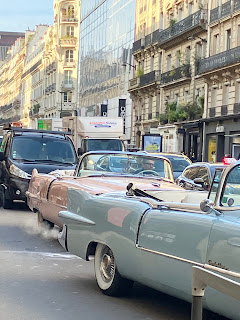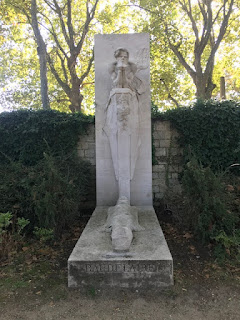28 Aug - 17 Oct 2022
Not having been to Paris prior to the residency (I used to feel like I was the only person in the world who hadn’t been to Paris), I was unprepared for its maximalist beauty. I spent my first few days holed up inside the garret, hiding from the spectacle so that I could finish my master’s thesis, a long poem which will be published this September.
Usually I am a morning person, but at the residency I got into the habit of staying up late at night writing and then sleeping in until 10 or 11am. I would emerge from the garret, slow and bleary, and purchase a pain au chocolat, usually at café madame, and an espresso, and I would take both to Jardin du luxembourg, and I would put my feet up on a green chair and read.
I read poetry by Diane Seuss, Louise Gluck, Lyn Heijinian, Denise Riley, J. H. Prynne, John James, Anna Mendelssohn, and Ilya Kaminsky. I read Runaway by Alice Munro, One thing I know by Pati Hill, Murphy by Samuel Beckett, The Autobiography of Alice B. Toklas by Gertrude Stein, Either/Or by Elif Batuman, and, after finding a copy at my favourite English language bookshop, San Francisco Book Co, I reread Who Will Run The Frog Hospital by Lorrie Moore.
I even read some of The Space of Literature by Maurice Blanchot. This text helped me think about what it means to be writing, or what it means to (try to) be a writer. I wrote a series of poems about Franz Kafka’s loneliness as a way of thinking through why one might choose to be alone, romantically and/or geographically.
My friend Teddy, an artist living in the north of Paris, saved me from too much introspection by taking me to galleries. I loved the Pinault Collection at the Bourse de Commerce, but my favourite place was the magical Gustave Moreau museum.
Paris taught me to how to see. I learnt that paintings, buildings and films could be all read like how poems are read.
Most days I walked down Rue de Fleurs and gave a respectful nod to Stein’s house. Stein is an important writer to me. She taught me to find aesthetic pleasure in linguistic confusion. Often I walked around the Montparnasse cemetery, locating the resting places of Simone de Beauvoir, Charles Baudelaire, and Beckett. Once I travelled to Père Lachaise, to lay a rose on the grave of my favourite writer, Marcel Proust.
I feel most at home in busy cities, probably because I grew up in London. Like Frank O’Hara, I am moved and inspired by urbanism. The juxtaposition of the peaceful solitude of the garret with the surging life-force of the chattering terraces summoned a useful tension. Not being a French speaker, I could not fully integrate into the happenings of Paris. Positioned at a distance, I admired the city as if it was the greatest, the most dazzling epic poem.
One evening I cycled to the American library to see a Q and A with the poet Eileen Myles. In response to one question, Myles said that women and queer people come of age through two events: the first act of sexual violence committed against them, and the first time they decide to write. I turned 30 during my time at the residency, and I was considering my personal history, and how it came to be that I believed that writing was important. I was writing a lot of diary entries, the kind of writing that isn’t meant to be seen, the purpose of which is a kind of self-knowledge.
I am so grateful to Elizabeth for giving me the opportunity to roam around Paris for seven weeks, amongst the homes and graves of writers who have made me who and what I am. I value not just the time I had for writing, but the space I had for thinking, for considering the act of writing, in conjunction with exploring the city, with that feeling of solitude, with that feeling of loss that is actually very giving, the giving-ness I suppose that comes with deliberately not being at home.


